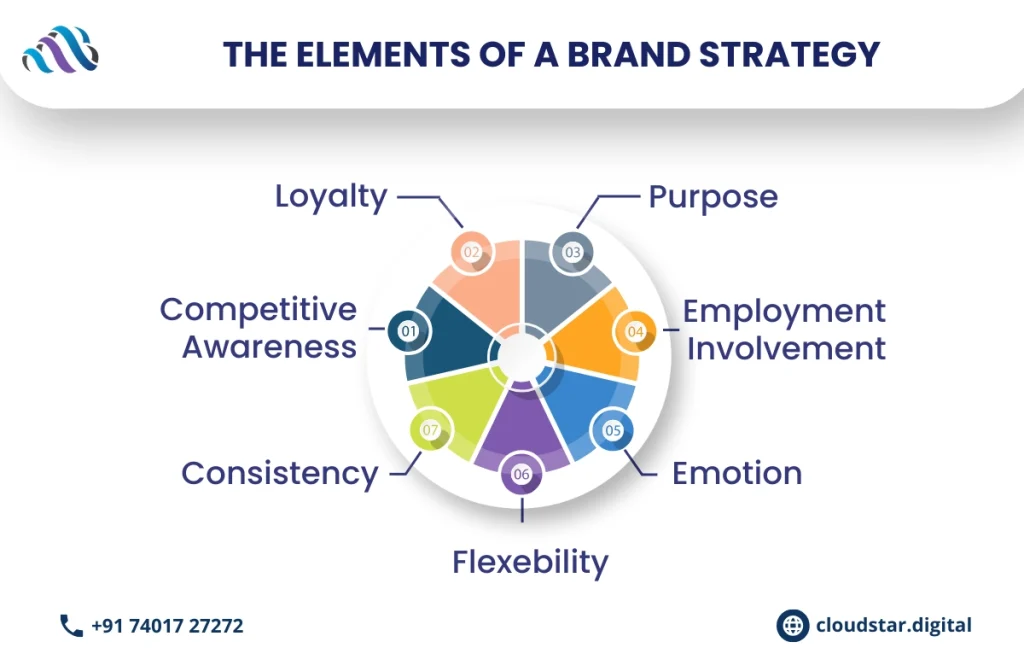In today’s competitive business landscape, brand marketing plays a crucial role in how companies connect with consumers and differentiate themselves from competitors. But what is brand marketing, and how does it work? In this detailed post, we’ll break down the fundamentals of brand marketing, explore effective brand marketing strategies, and discuss the importance of branding in marketing. We’ll also clarify the difference between branding and marketing, provide examples, and highlight key takeaways for businesses looking to build a stronger brand presence.
What is Brand Marketing?
Brand marketing is the strategic approach to creating, maintaining, and promoting a company’s brand. The goal of brand marketing is not just to push products but to build an emotional connection with customers, establish trust, and foster long-term loyalty. It involves everything from defining your brand identity, positioning your company in the market, and communicating with your audience through various channels.
At its core, brand marketing is about creating a story around your product or service that resonates with consumers and makes your company stand out.Successful brand marketing strengthens your company’s image, enhances customer loyalty, and drives business growth. With digital marketing for doctors in India, you can effectively promote your practice and attract more patients.
What is the Difference Between Branding and Marketing?
Many people confuse branding and marketing, but these terms are distinct, even though they’re closely linked. Here’s a breakdown of the differences:
Branding:
- Focus: Branding is the process of defining and creating a unique identity for your company. This includes your logo, colors, messaging, voice, and overall company values.
- Goal: The primary aim is to create an emotional connection and a recognizable identity that resonates with your audience.
- Outcome: A strong brand builds customer trust, loyalty, and awareness, ultimately differentiating you from your competitors.
Marketing:
- Focus: Marketing, on the other hand, involves the tactics used to promote specific products or services. This can include digital advertising, public relations campaigns, content marketing, and more.
- Goal: The focus is on generating sales, leads, and conversions.
- Outcome: Successful marketing campaigns result in measurable actions like purchases or sign-ups.
While brand marketing strategies shape your brand’s identity, marketing strategies focus on generating direct responses from your audience.
The Importance of Branding in Marketing
Branding plays a significant role in your overall marketing strategy. The importance of branding in marketing is that it helps create a solid foundation for all marketing efforts. Here’s why branding is crucial:
1. Building Trust and Loyalty
A strong brand increases credibility and trust. When people recognize and feel comfortable with your brand, they are more likely to make purchases and become repeat customers.
2. Establishing Differentiation
Effective branding helps distinguish your business from competitors. When your brand’s identity is clear, consumers are more likely to choose your product over others in a crowded marketplace.
3. Creating Emotional Connections
Branding isn’t just about logos and colors; it’s about evoking emotions. Strong brands create a connection with their audience that goes beyond the functional benefits of a product or service.
4. Driving Business Growth
Well-executed brand marketing strategies lead to sustained growth by fostering loyalty, increasing brand awareness, and encouraging word-of-mouth promotion.
The Overarching Goal of Brand Marketing is to Grow the Business
Ultimately, brand marketing aims to grow the business by positioning the brand in a way that attracts and retains customers. This is achieved through consistent messaging, a solid brand identity, and clear communication of the brand’s values. By creating an emotional bond with consumers, businesses can drive repeat purchases, higher customer lifetime value, and advocacy.
Three Things to Remember in Brand Marketing
When diving into brand marketing, it’s important to focus on a few key principles:
1. Consistency Across Channels
Brand consistency is crucial for building trust and recognition. Make sure your brand’s message, design, and tone remain the same across all marketing channels, whether it’s on your website, social media, or email marketing.
2. Know Your Audience
Effective brand marketing is rooted in understanding your target audience. Know their needs, preferences, and pain points so you can tailor your messaging to resonate with them.
3. Be Authentic
Consumers value transparency and authenticity. It’s important to present your brand in a way that feels real, honest, and relatable.

Examples of Effective Brand Marketing Strategies
Now that you have a basic understanding of brand marketing, let’s take a look at some examples of effective brand marketing strategies:
1. Apple
Apple’s brand marketing focuses on minimalism, innovation, and premium design. They’ve built a loyal customer base by consistently reinforcing their values of simplicity and creativity. Their advertising, product designs, and user experiences all align with their brand.
2. Nike
Nike uses emotional storytelling in its marketing to connect with athletes and everyday consumers. Their “Just Do It” campaign focuses on perseverance and self-improvement, encouraging people to push their limits.
3. Coca-Cola
Coca-Cola’s brand marketing has always emphasized happiness, family, and togetherness. Their campaigns, such as “Share a Coke,” are designed to build emotional connections with their audience and enhance brand loyalty.
How Social Media Impacts Brand Marketing
Social media has transformed the way businesses engage with customers. Through platforms like Instagram, Facebook, and Twitter, companies can directly interact with their audience in real time. Here’s how social media impacts brand marketing:
- Increased Brand Visibility: Social media allows brands to reach a global audience and build recognition.
- Customer Engagement: Social media gives businesses an opportunity to engage with their audience in a more personal and interactive way.
- User-Generated Content: Encouraging customers to share their experiences with your brand can build authenticity and trust.
Noteworthy Brand Marketing Campaigns
Some iconic campaigns have exemplified the power of brand marketing. These campaigns have not only been successful in terms of sales but also in building long-term brand equity.
1. Dove’s “Real Beauty” Campaign
Dove’s “Real Beauty” campaign celebrated diversity and broke conventional beauty standards. By promoting body positivity and inclusivity, Dove created an emotional connection with its customers.
2. Old Spice’s “The Man Your Man Could Smell Like” Campaign
This campaign turned the Old Spice brand into a cultural phenomenon. It used humor and an engaging narrative to reposition Old Spice as a brand for a younger, trendier audience.
How Do You Measure Your Brand Marketing Efforts?
Measuring the success of your brand marketing is essential for refining your strategy and achieving long-term goals. Some key metrics to track include:
- Brand Awareness: Track how many people are recognizing your brand. Use tools like social media engagement and surveys to gauge awareness.
- Customer Sentiment: Monitor how customers feel about your brand. This can be done by analyzing reviews, social media mentions, and customer feedback.
- Brand Loyalty: Measure repeat purchases, customer retention rates, and referrals.
- Web Traffic: Track increases in website visits and conversions that are attributed to brand awareness efforts.
Branding vs Marketing
In conclusion, understanding branding vs marketing is essential for creating a successful strategy. Branding is the process of defining and establishing your company’s identity, while marketing refers to the tactics used to promote products and drive sales. Both work together to support business growth and create lasting relationships with consumers.
Digital Marketing Strategy for a Brand
Creating a digital marketing strategy for a brand is essential in today’s fast-paced online landscape. Whether you’re looking to build brand awareness, reach new customers, or establish a solid presence in the digital space, a well-thought-out plan is key. In this blog, we’ll explore what a digital marketing strategy involves, how it benefits your brand, and step-by-step instructions to build a successful digital presence.
Developing a digital marketing strategy for brand awareness involves more than just launching a few social media posts or running ads. It’s about creating a cohesive, multi-channel approach that aligns with your brand’s goals and target audience. From SEO to social media and email marketing, a well-rounded digital marketing strategy for brand awareness ensures your brand stands out and delivers the right message at the right time.
In this guide, we’ll break down the process of crafting an effective digital marketing strategy for brand awareness that drives results. By leveraging various digital channels, you can enhance your brand’s visibility, engage your audience, and ultimately foster loyalty.
Conclusion
What is brand marketing? It’s a strategic approach to building and maintaining your company’s identity in the marketplace. With effective brand marketing strategies, you can create emotional connections, increase customer loyalty, and ultimately grow your business. By understanding the importance of branding in marketing, as well as the difference between branding and marketing, you’ll be better equipped to develop a brand that stands the test of time. Keep these principles in mind, and remember that brand marketing is an ongoing effort that requires consistency, authenticity, and customer-centric thinking.

